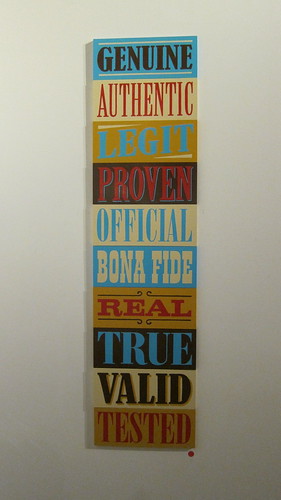 I think one excellent way forward for most libraries would be to adopt an aggressively pro-simplicity stance. We often make decisions about services or models based on the need to accommodate everyone - the need not to put anyone out, rather than the need to really inspire people to use what we have. It's very difficult, perhaps impossible, to be both inspirational and compromising at the same time. Look at loan periods as a really basic example. Most libraries have a lot of them - this is an attempt to make sure everyone is catered for. But sometimes it's so complicated as to be detrimental to the users.
I think one excellent way forward for most libraries would be to adopt an aggressively pro-simplicity stance. We often make decisions about services or models based on the need to accommodate everyone - the need not to put anyone out, rather than the need to really inspire people to use what we have. It's very difficult, perhaps impossible, to be both inspirational and compromising at the same time. Look at loan periods as a really basic example. Most libraries have a lot of them - this is an attempt to make sure everyone is catered for. But sometimes it's so complicated as to be detrimental to the users.
Simplicity is great for many reasons. It allows focus. It allows us to market with clear messages about what we do. It helps the user feel like they know where they are. It stops the model being too diluted by attempts not to offend. And - and this is the key point I want to make in this post - people can often prefer simplicity even to desirable options.
Think about your own experiences. Let's take a mundane example - sometimes it's nice to go to a coffee shop and have a choice between an Americano, an Espresso and a Latte, in two sizes. Even if you really like cinnamon lattes or whatever, you might prefer the simplicity of options to 7 different types of coffee, in three different sizes, with syrup options ago-go.
There's all sorts of retail experiences like that - booking hotel rooms or flights, for instance, or choosing a sandwich in Subway... - where options that are designed to personalise the experience to suit you actually just get in the way of some sort of essential process.
So I think (and I'm thinking about all this because I suggested it at a work meeting the other day) that all new processes and models and services should be designed to be simple and to make an impact, rather than to cover all the bases. (I realise librarians often feel a sort of moral obligation to make sure we're not disadvantaging anyone, and I'm definitely in favour of that as long as it doesn't come at the expense of our actual future.) And I think any services we re-design should be re-designed at least partly with the question 'What would users who'd NEVER EXPERIENCED THE OLD SYSTEM really want her?e' uppermost in our minds, as well as the need not to offend existing users. Chances are, they'd want something efficient, non-complicated, and easy to understand.
- thewikiman
p.s some of the themes in this post are also covered in my previous one



